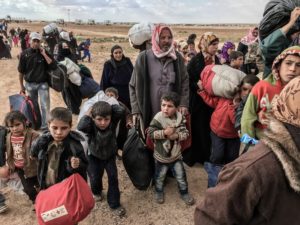
[Image description: A still of a group of refugees, including many children, from the film Human Flow, which opens this Friday.]
One of the best things about living in Ithaca is how many options we have for spending our time. While the lake, gorges, and surrounding flora and fauna offer up countless year-round recreational options, Ithacans have even more choices when it comes to indoor entertainment and learning.
In the latter case, three refugee-related events should be on your radar this week, starting tonight:
Monday, Oct. 16
5:30 p.m.
Panel Discussion: Refugees in the United States
Panel hosted by Cornell Welcomes Refugees, Klarman Hall, Cornell
(http://bit.ly/2ykhShE)
What does it mean to be a refugee in the U.S.?
Cornell Welcomes Refugees will be hosting a panel consisting of members of the Cornell community to foster discussion about a community of people who are forcibly displaced due to violence, war and persecution.
Political confusion, gridlocked regional interests and groundless stereotypes are taking our attention away from the refugee crisis that have consumed so many regions of the world. What is at stake is nothing less than the survival and well-being of a generation of refugees.
Join CWR to hear about the contributions of refugees in the United States, understand the work of resettlement agencies, and discuss the legality of the partial travel ban that has been i
mposed recently.
Wednesday, Oct. 18
7:30-9:00 p.m.
“Get on a Plane! Fighting for Refugees in the Age of Trump”
Lecture at the Bronfenbrenner Center for Translational Research
Call Auditorium, Kennedy Hall
(http://bit.ly/2xDIzPk)
Becca Heller, co-founder and director of the International Refugee Assistance Project, will discuss how advocates can fight for the rights of refugees against the waves of right-wing populist xenophobia sweeping through the U.S. and Europe.
What obstacles do Syrian and other refugees face in attempting to seek safe passage?
How has the politicization of refugees conflated mass migration with terrorist infiltration?
And how are a group of lawyers and law students fighting back?
Rebecca M. Heller is a Visiting Clinical Lecturer in Law at Yale Law School. She graduated from Yale Law School in 2010 and received her B.A. from Dartmouth College. She founded and directs the International Refugee Assistance Project (formerly the Iraqi Refugee Assistance Project) at Yale Law School, an organizatio
n that assists refugees in applying for resettlement from abroad and adjusting to life in the United States.
- Kennedy Hall is at 215 Garden Ave, Ithaca, NY. Call Auditorium is on the first floor.
Parking is available in the garage at 165 Hoy Road.
Admission is free and open to the public.
Opening Friday, Oct. 20
“Human Flow”
Ai Weiwei’s documentary on the refugee crisis opens at Cinemapolis
(https://cinemapolis.org/film/human-flow/)
More than 65 million people around the world have been forced from their homes to escape famine, climate change and war, the greatest displacement since World War II. Filmmaker Ai Weiwei examines the staggering scale of the refugee crisis and its profoundly personal human impact. Over the course of one year in 23 countries, Weiwei follows a chain of urgent human stories that stretch across the globe, including Afghanistan, France, Greece, Germany and Iraq.
From the New York Times review:
“’Human Flow’ opens and closes with aquatically themed imagery, beginning with a shot of a deep, dazzlingly blue body of water. It’s a soothing, almost meditative vision as well as a seductive dream of nature as a balm and refuge. This pacific picture, though, is soon replaced by far more disturbing, recurrent images of perilously small boats filled with frantically shouting, gesturing men, women and children seeking asylum. In one makeshift port and then another there is splashing and disembarking and then cries and hugs as babies are gingerly passed from hand to hand. It’s a distressing, familiar scene in some ways, one that has been playing on our televisions for years.
What Mr. Ai seeks is to go far beyond the nightly news; he wants to give you a sense of the scale of the crisis, its terrifying, world-swallowing immensity. And so he jumps from one heartbreak to the next, passes through Gaza, drops into Pakistan, spends time in Turkey and ambles along the border separating (somewhat) Mexico and the United States, where an American border guard rather ridiculously tries to explain where Mr. Ai can and cannot go. Mr. Ai also visits a number of refugee camps that range from the squalid to the unimaginable and, as he does throughout, he shows you both the dignity and the misery at street level before using drones to soar over the camps.”